Sezgin Ismailov's Blog, page 8
March 10, 2025
My opinion on "The wolf changes its fur, but never its temper."
This proverb, deeply rooted in Balkan culture and reflecting similar sentiments in many societies, speaks to the basic idea of unchanging nature. It suggests that while appearances may change, adapt, or even deceive, the basic character of a person or thing remains stubbornly constant. Wolves, like many animals, adapt to their environment. Their fur changes with the seasons, providing camouflage and protection against the elements. This visible transformation is a natural, necessary part of survival. From a human perspective, this "changing of the coat" represents the superficial modifications we all undergo. We adapt to different social conditions, adopt new fashion trends, learn new skills, and even change our behavior in order to fit in or succeed. We may change our jobs, our hairstyles, our political affiliations, or our friend groups. These are all external manifestations of change, driven by circumstance, ambition, or simply the passage of time. We are constantly bombarded with messages encouraging self-improvement and personal growth. We are told to learn new skills, adapt to changing market demands, and reinvent ourselves in order to stay relevant. This constant emphasis on external change can sometimes obscure a deeper, more profound question:
Can we really change our fundamental nature? A wolf, regardless of the color and thickness of its fur, is still a wolf, with its inherent instincts and behaviors. This notion of an unchangeable disposition speaks to the enduring power of personality traits, ingrained habits, and deeply held beliefs. It suggests that while we can change our behavior to some extent, we cannot fundamentally change who we are at our core. A person who is inherently dishonest, for example, may be able to suppress his or her deceptive tendencies for a time, but the underlying tendency will always be there, waiting to resurface. The proverb resonates so strongly because it involves a long history of observation of animal and human behavior. Throughout history, people have noticed that certain traits seem to persist across generations and environments. The proverb also reflects a degree of fatalism, a belief that our destinies are predetermined and that we have limited control over our own lives. This fatalistic perspective is common in many cultures, especially those that have experienced hardship and instability. The proverb offers a simple explanation for the persistence of undesirable behavior and the difficulty of achieving lasting social change. Modern psychology recognizes the complexity of human personality and the influence of both nature and nurture. While some personality traits are indeed inherited, our experiences, relationships, and choices also play an important role in shaping who we become. Therapy, education, and even profound life events can lead to real and lasting changes in our behavior and attitudes. Perhaps the proverb's true wisdom lies not in its literal interpretation, but in its cautionary message. It reminds us that real change requires more than just superficial adjustments. It requires a deep and honest self-assessment, a willingness to confront our own shortcomings, and a commitment to continuous personal growth. Rather than viewing the proverb as a statement of unchangeable fate, we can view it as a call to action. It challenges us to acknowledge our own tendencies and to actively work to become the people we aspire to be. It reminds us that while we cannot completely escape our nature, we can certainly learn to master it, channel it, and ultimately transcend it.
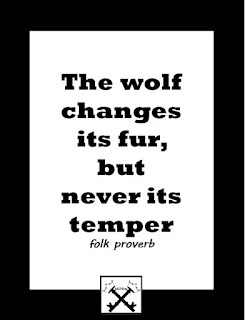 Personally, I think the only way out is education from childhood.
Personally, I think the only way out is education from childhood.
March 9, 2025
The Laws of Mother Nature
Pious people call the invisible force God. Scientists call this force Energy. Ordinary people call it Mother Nature. In order for us to have it, everything that this force has given us needs Balance. Like plus and minus. Joy and sadness. Light and dark. Birth and death. When we think a little more, we see that everything has its reverse side. When we delve a little deeper, we discover many interesting facts. For example, rivers do not drink their own water, trees do not eat their own fruits, and the sun does not shine on itself. Everything is created in such a way that life for others is a law of nature. For example, a doctor does not treat himself but treats other people, so he gives of himself to others. A shoemaker also makes shoes for others. A teacher teaches others. It is now a question of who gives how much of himself for others and with what intention. When we look at history, those who are famous did not only have an ideal life. There have been good times and bad times. The more you laugh, the more you grieve. It turns out that we are all born to help each other. The extent to which we assist each other varies. Nature shows us that giving and sharing are natural and necessary for the maintenance of life. Life for others is a law of nature. That serving others is not just a moral choice but a basic principle of existence. This principle reminds us that we are part of a larger system and that our actions have an impact on others. Selflessness and serving others are basic principles of life. True happiness is found in making others happy. No matter how difficult it is. Life is beautiful when you are happy. However, how will we know if we are truly happy? Probably by making someone else happy with our actions. By reading or hearing the words about our actions. We see the effect of our actions. For example, you helped someone who was in need at that moment. Even if you inspire someone who has despaired by showing them the right path, you have given them hope. There are laws that we cannot change. When we throw a ball at the wall in front of us, it returns to us with the same force with which we threw it. Our successes are measured by the same force. If you have created a product that is used by many people, then your success rewards you. I will never forget my grandfather's words. Whoever does whatever he does always thinks that he is doing the best for himself but does not realize that with his actions and words he may harm others and that will come back to him someday. However, this is always in some way connected to our loved ones. Your successes, for better or worse, always go with the people around you.
March 8, 2025
The proverb "Water treads, thirsty walks"
The proverb "Water treads, thirsty walks" is an expression of paradox and absurdity that occurs in various situations in life. What do I understand from it? As a basic assumption, first, the presence of a resource, but lack of use: The proverb describes a situation in which a person is in close proximity to something they need but, for some reason, cannot or does not know how to use. Second, as inefficiency and pointlessness: It emphasizes the pointlessness of efforts when they do not lead to the desired result. We can add many more different interpretations: In personal qualities: It can refer to a person who has the necessary skills or resources but does not use them due to laziness, incompetence, or fear. Very often we witness our neighbor or acquaintances in this situation. In social situations: It can be used to describe a society or organization in which there is an abundance of resources, but they are not distributed fairly or effectively. Especially if you live in a rich country and see the dishonesty of the politicians you actually voted for. In environmental problems: In the modern context, the proverb can be associated with problems such as water pollution, which makes the available water resources unusable. Especially for the dishonest/corrupt management of the control bodies when inspecting objects in this case . There are as many examples of use as you want: It can be said about a person who has many friends but feels lonely. Especially those who have no goal. It can be used to describe a country rich in natural resources but with a poor population. We come back to the people who are posts and get a salary for it. It can be used when talking about poor management of water resources. Provided, taking into account that the earth is mostly covered with water. Drinking water is only a small percentage of this, and let's pray that the time does not come when I will not dig further. The proverb “Water treads, thirsty walks” is universal and can be applied to various aspects of life. It reminds us that having something does not guarantee its usefulness and that it is important to know how to use the resources we have.
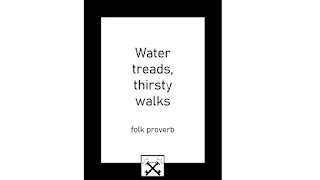
March 5, 2025
Having control over others is power; having control over yourself is dominion
The idea that power over other people is less important and difficult to achieve than power over one's own thoughts, emotions, and actions. Control over others : This refers to the ability to influence or direct the behavior of other people. This can be achieved through various means such as authority, persuasion, manipulation, or even force. Control over oneself: This is a much deeper and more difficult form of power to achieve. It requires awareness, discipline, self-control, and the ability to manage one's inner impulses and reactions. The proverb emphasizes that true power does not lie in external control but in inner freedom and the ability to master oneself. Self-control is a prerequisite for personal development, happiness, and success. A person who is aggressive and dominant may have "power" over others, but if he cannot control his anger, he is not master of himself. A successful entrepreneur can lead a large team, but if he cannot manage his time and emotions, he has not achieved true "mastery.". The proverb reminds us that the most important battle we must win is the one with ourselves. Developing self-control and discipline is the key to true personal growth and achieving inner peace.
Is this exactly what the author wanted to say in the book <The Wealth of the Great Kingdom>? To understand, you have to read the book.
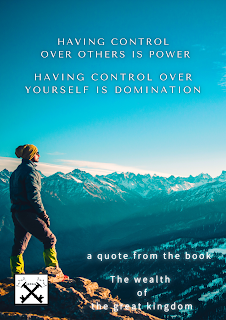
Description of my fifth book - Unforgettable personalities of history
People Who Changed the World
Get to know the most famous names fromancient times to the present day who have left a lasting mark on the history ofmankind. Find out who the brave explorers, brilliant scientists, famouscreators, and wise leaders are. Get acquainted with a brief description andphoto of their brilliant ideas, incredible discoveries, and unimaginablesuccesses, as well as how their social impact and courage have shaped ourworld. A person can inspire you and unlock your hidden talent and potential. Anopportunity to become a future leader, creator, or discoverer! The book is anideal read for children over 12 years old who are eager to get acquainted withhistory and the extraordinary personalities who have shaped our world.
Expect it in all e-stores. You can also order it from bookstores within a month. The book is available in hardcover and softcover as well as an e-book. You can also read it for free in the promotions of Smashwords:👇 https://www.smashwords.com/profile/vi...

You can look for it to read in soft and hard covers, as well as an e-book in all the stores you know.
Amazon, eBay, Adlibris , Powells , Rakuten , Kobo , Barnes & Noble, Kinokuniya , Thalia , JPC , Abebooks.com , Takealot.com , Booklooker , Alibris, Morawa, Booktopia, Triftbooks, WOM, Google Play, Flipkart , Hugendubel, Bücher, Michaelsbund, Dumocks, Kitapavrupa, Pandora, BOL, Orellfüssli, Lehmanns, Walmart, Eurobuch, Tredition, Biblio, Faltershop, Helikon, Legimi, Bokus, D§R, Imge, Cinius, Indigo, Imusic, Athenaeum, Kaufland, Mondadoristore, Paagman, Weltbild, Betterworldbooks, Blackwells, Ebook, Exlibris, Lesen, Libroworld, Lesejury, Kitapsepeti, Ozone, and many others
March 3, 2025
Time as an impartial judge
Time is the greatest critic; it will show who is right and who is wrong. This proverb is deep and multi-layered, and it hides several important truths: Time is presented as a neutral force, not influenced by emotions, biases, or momentary circumstances. It simply flows and reveals the truth.
* This means that any lies, manipulations, or dishonest actions will sooner or later be exposed.
* **The truth always comes out:**
* The proverb teaches us that truth is persistent and that in the end it will always prevail.
* Even if someone manages to hide the truth for a while, time will reveal it.
* **The consequences of our actions:**
* Time shows us the real consequences of our actions.
* If we have acted correctly and honestly, time will reward us. If we have acted incorrectly, it will punish us.
* **Patience and Wisdom:**
* The proverb teaches us to be patient and not to rush to judgment.
* Sometimes it takes time for the truth to be revealed.
**Examples:**
* In politics: Time shows whether a politician acted in the interest of the people or in his own interest.
* In business: Time shows whether a business strategy was successful or unsuccessful.
* In personal relationships: Time shows whether a friendship or relationship is true or false.
Ultimately, the proverb "Time is the greatest critic; it will show who is right and who is wrong" reminds us that we should strive to be honest and fair, because in the end, time will reveal the truth.
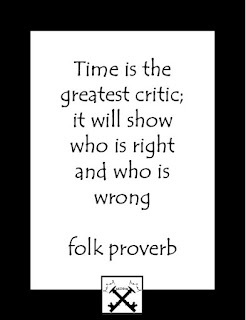
March 2, 2025
Draw water from the new well, but don't spit in the old.
Accepting the new, without denying the old: "Draw water from the new well" symbolizes openness to new opportunities, knowledge, and experience. This is a call to take advantage of new things and develop. "But don't spit in the old" reminds us not to forget and not to belittle the past, roots, traditions, and people who have helped us. Respect for the past: The old well is a symbol of something that has served us, that has been valuable to us. Even if we have found a better source, we must maintain respect for what it has given us. Gratitude and appreciation: The proverb teaches us gratitude for the people and things that have been a part of our lives. We should not forget where we came from and who has helped us along the way. Wisdom and balance: It advises us to be wise and find a balance between the new and the old, between progress and tradition. In the modern context, this proverb can be applied in many situations: At work: to learn from new technologies and methods but not to forget the experience and knowledge of older colleagues. In personal relationships: to open up to new friendships and connections but to value and maintain old ones. In society: To strive for progress and development, but not to forget our cultural heritage and traditions. Overall, the proverb is a valuable lesson in wisdom, gratitude, and balance in life
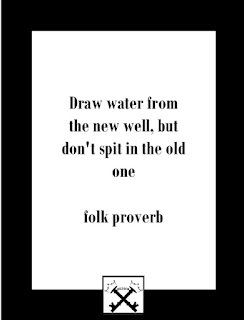
March 1, 2025
How money or power changes our perceptions
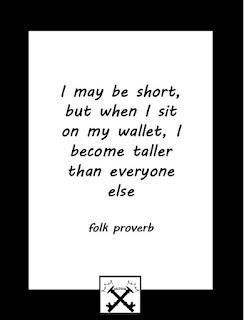
February 28, 2025
The Two Most Valuable Assets - Health and Time
In our fast-paced world, we often forget about two of the most valuable things in life—health and time. They are inextricably linked, and investing in one invariably leads to benefits for the other. Health—the key to a longer and more fulfilling life. Health is the foundation on which we build our lives. When we are healthy, we have the energy and the opportunity to enjoy every moment. We can work, have fun, travel, and take care of our loved ones. Unfortunately, many people realize the value of health only when they lose it. Don't wait for this to happen. Start taking care of yourself today: every day is valuable time for you. Eat healthy: Eat more fruits, vegetables, whole grains, and protein. Limit processed foods, sugar, and saturated fats. Exercise regularly: Find a physical activity that you enjoy and try to practice it for at least 30 minutes a day. Get enough sleep: Get 7-8 hours of quality sleep every night. A prime example is the Japanese. They are not overweight and have the longest life expectancy. Manage stress: Find ways to deal with stress, such as meditation, yoga, or walks in nature. Get regular checkups: Early detection of health problems can save lives. Investing in your health buys you time When we take care of our health, we not only feel better, but we also increase our life span. This gives us more time to enjoy the things we love, spend time with our loved ones, and achieve our goals. Time is our most valuable resource. Don’t waste it by neglecting your health. Invest in it, and you will enjoy a longer, happier, and more fulfilling life. Time and health are interdependent. Take care of your health, and you will have more time to enjoy life. No matter how much material wealth we have, it cannot be compared to health. Because I have not heard or seen anyone take anything to the other world except themselves.
February 27, 2025
Description of my first book- Manners in the Great Kingdom:
Max's stories with the wise people The choices which we make for our future, who we really want to be, how we want to feel every day, how many and what friends we need to have, what the biggest obstacles are for us, and how we would like our life to go on—all that can be learned and understood from the good manners of Crown Prince Max. The final stage of Max's training consists of meetings with people and events in the different kingdoms. Each story is about everyday relationships and the personal experiences in his/her life. The right choice is the formula for a beautiful and peaceful life.
You can also order it from all electronic stores and bookstores. The book is available in hardcover and softcover, as well as as an e-book. You can also read it for free in Smashwords promotions:👇 https://www.smashwords.com/profile/vi...

You can look for it for reading in softcover and hardcover, as well as an e-book in all your familiar stores.
Amazon, eBay, Adlibris, Powells, Rakuten, Kobo, Barnes & Noble, Kinokuniya, Thalia, JPC, Abebooks.com, Takealot.com, Booklooker, Alibris, Morawa, Booktopia, Triftbooks, WOM, Google Play, Flipkart, Hugendubel, Bücher, Michaelsbund, Dumocks, Kitapavrupa, Pandora, BOL, Orellfüssli, Lehmanns, Walmart, Eurobuch, Tredition, Biblio, Faltershop, Helikon, Legimi, Bokus, D§R, Imge, Cinius, Indigo, Imusic, Athenaeum, Kaufland, Mondadoristore, Paagman, Weltbild, Betterworldbooks, Blackwells, Ebook, Exlibris, Lesen, Libroworld, Lesejury, Kitapsepeti, Ozone and many more



